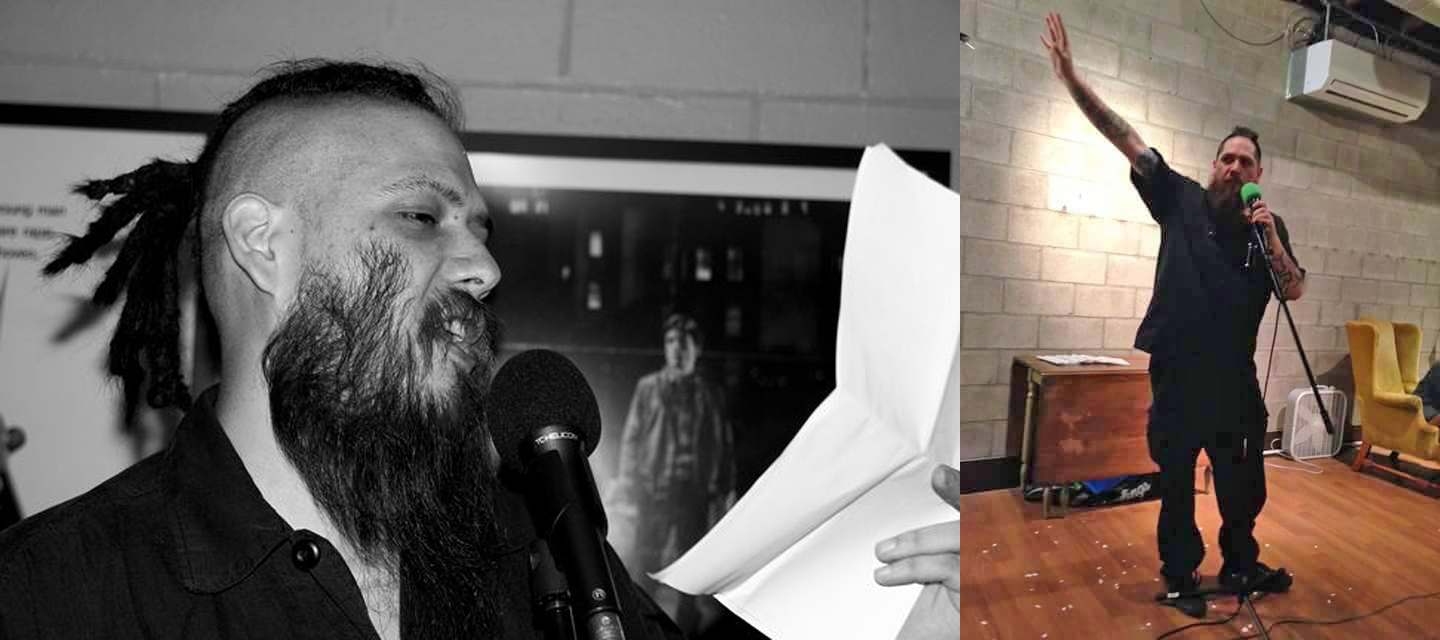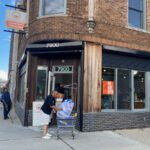This is the first in a series of interviews with some of the best open mic hosts I’ve seen on my informal tour of open mics across America.
The idea is to pull back the curtain on what it takes to be a host, what hosts want out of an open mic, and how to make an event work when you have no idea what’s going to happen. And maybe even hear a poem or two about open mics.
Go long, she said. Give examples, she told them. Tell stories.
The Basics
Tell me about the open mic you run—the rules, the structure, the venue. How long have you been doing this? Did you launch it or inherit it from another host? That kinda thing.
I’m Honest Lewis. Together with my friend, business partner, and accomplice, Heather Brothers-McDole, we run The Night of Free Speech in Nashville, Tennessee. Heather is the brains of the operation. She handles logistics and booking and does all the graphic design and leaves to me the promotional work and hosting duties. The Night of Free Speech has been running for coming up on five years now come September 2017.
It happened by accident.
A friend of ours—an artist, writer, and singer, Mitchell Savage—asked me to read some of my fiction at an event he was hosting. I did. Mitchell was planning on hosting a monthly series of readings but he couldn’t dedicate the time to it—he was a long haul trucker before embarking on his musical career in Turkey—so Heather and I asked if we could carry that flag. Five years later we’re still carrying it.
The venue-space we’ve used for it has changed a few times. I even had a enough success with a novel to attempt to acquire a more permanent location to house our show as well as host other creative events in Nashville, but that unfortunately fell through. Currently we’re holding events at Bearded Iris Brewery. It’s a location that comes with obvious benefits.
A Little Flattery and Some Introspection
In my (evidence-based) opinion, your open mic is one of the best I’ve been to. What do you think makes it great?
You can cross the Dardanelles on a raft made of pure flattery.
I have no idea what makes us a “good” open mic. This is a case where I’m forced to rely on the opinions of others.
The consensus opinion about the NOFS is that we are authentic. We strive with each event to create an environment for poetry, spoken word, prose, fiction, rants, whatever, without pretense, where everyone is welcome regardless of race, class, sex, gender, preference, religion or lack, ideology, level of formal education—which is typically a sign of class, age, and disability status. We actively strive towards diversity.
And when I say diversity I’m not referring to the species of faux-diversity that makes its home on advertisements where everyone is colored different or has a relationship outside the mainstream but is still clean, neat, obviously college educated, and blissfully middle class. We strive towards real diversity.
It is something that Heather and I have discussed and worked towards through years of friendship and years of professional collaboration.
It matters to us to try.
One thing I appreciated about you as a host was the way you took time to acknowledge and appreciate a couple first-timers for their courage. Is that something you always do?
Anna, you might have noticed on your trip to Nashville to read with us that I host an open mic event with an obvious speech impediment. It is not a recent verbal tick. It’s been there my whole life. And to be frank, I’ve suffered a lot of abuse because of it.
Because of this I am intimately aware of how hard it is to get up there in front of strangers and talk where they can hear you. And I know how terrifying it is to get up there in front of strangers and not only talk but share something with them that you made. Something that you might have gone through a lot to make, that might have taken hours and weeks and years. Something that might be your history or your projected future or your dreams. Something that is you. Quintessentially entirely you. I know how hard that is. I fight that fear every time I get up in front of that mic to speak. It’s been nearly five years and I’m still afraid of that microphone.
So I know that fear. And I know, without any question: Overcoming that fear can change your life.
I always thank new readers for their courage and I always ask that the community recognize their bravery as well. Having the community recognize individual courage can make individual courage contagious.
You and Heather have a great dynamic as host and organizer. Tell me what makes that work.
Heather and I have a friendship that goes back to the beginning of both our adult lives. We’re disgustingly co-dependent platonic life-mates. We never really stop bickering and fighting and yet also never stop respecting and trusting one another.
Tell Us a Story (or Two)
What’s your idea of a Damn Great Night of open mic—in terms of talent, audience, or anything else?
I came of age in the hardcore punk scene. My ideal event is a sardine-packed space with a broken air conditioner. It’s hot as hell and twice as loud and you can hardly breathe or move and yet all eyes are on stage, fixed on the performer.
I don’t know how well we’ve been able to translate that into a spoken word event but we’ve had a few nights that came close.
There were just less thrown beer cans.
Let’s Talk Rules and Technique
How hardcore are you when it comes to open mic etiquette?
Our time slots range from five to seven minutes. If you go over I don’t usually mind, and even though we’ve had people who’ve gone on for much longer, I’ve never removed anyone from the microphone. But I have given some hand signals and reproachful stares.
If it’s excessive I’ll tell them in private that they’ll need to make their next set fits into our time structure.
Have you ever had to kick out, or ban, a performer from your event? If so, what for?
A few years ago I started hearing from some of the women that attend or participate in NOFS that one of the performers had been sexually harassing them. They wouldn’t name the performer. I had heard it from six different women by the time Heather brought it to my attention that one of our readers had been grabbing at her. She had no problem telling me who it was, and he was already as good as banned next time I saw him. I ran this person’s name by the other people who came to me with harassment claims and they all verified it was this same person.
When he arrived at the next event, I told him he was no longer welcome due to his sexual harassment. That it was non-negotiable. And that he should leave now.
I unfortunately did not pass this information on to other spoken word nights in Nashville and some months later one of these nights booked him to host an event. I went to this event’s organizers and informed them that they were giving a position of trust and authority to a known sexual harasser, who would have likely sexually harassed women who would be in the audience that night.
They listened to me.
I gave them Heather’s information so she could corroborate the story.
After these conversations they informed me that they planned to go ahead and use him as the host anyway. They were of the opinion that they could “control him” and would be able to “keep an eye on him.”
I thought on the situation for a day. Then I let them know that my conscience would not permit me to silently allow them to permit a known sexual harasser to be placed in a position of authority and that if they persisted I would out them to the community as a group of people who empowered sexual predators.
I was likely not as kind or politic in my approach as I could have been, but frankly when someone chooses to silence victims and empower predators my capacity for kindness and diplomacy is remarkably diminished.
It is interesting to me that due to this I am occasionally called an “enemy of free speech.” No one has told these people that you when empower the speech of predators you exclude the victims as well as those who do not want to give their time and attention to predators.
It creates a net loss of freedom.
And no physically unsafe environment can ever be truly free.
Show Me Your Wishlist
If you could perform at (or just attend) any open mic, slam, or other poetry event in the United States, all expenses paid, which one would it be?
I am not a poet. I value poetry. It is an important and crucial part of my life, but I am not a poet. I write long fiction and polemics—which is a fancy way of saying formalized devil’s advocacy.
With that in mind I would want to read my material to audiences that would hate it and hate me and yet listen with open mind while I document and describe the contradictions inherent in ideology, civilization, law, justice, comic book characters, educational systems, relationships, activism, the nature of reality itself.
I am intently curious as to how the hotdog we call civilization is manufactured. It is a constant source of material for a writer of any sort.
———
Want to meet Honest Lewis ? Find the next Night of Free Speech under the auspices of Nashville’s DNR Publishing on Facebook.




